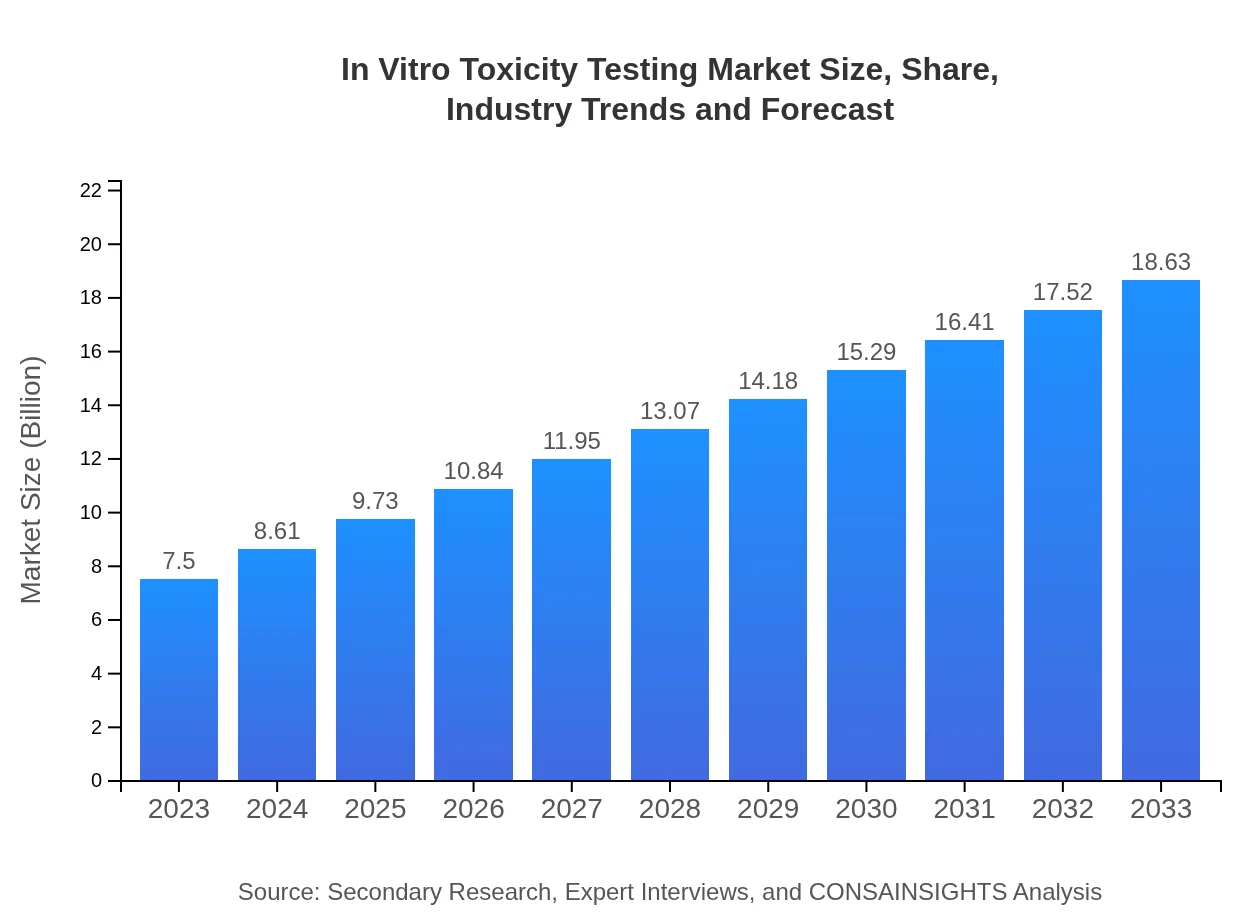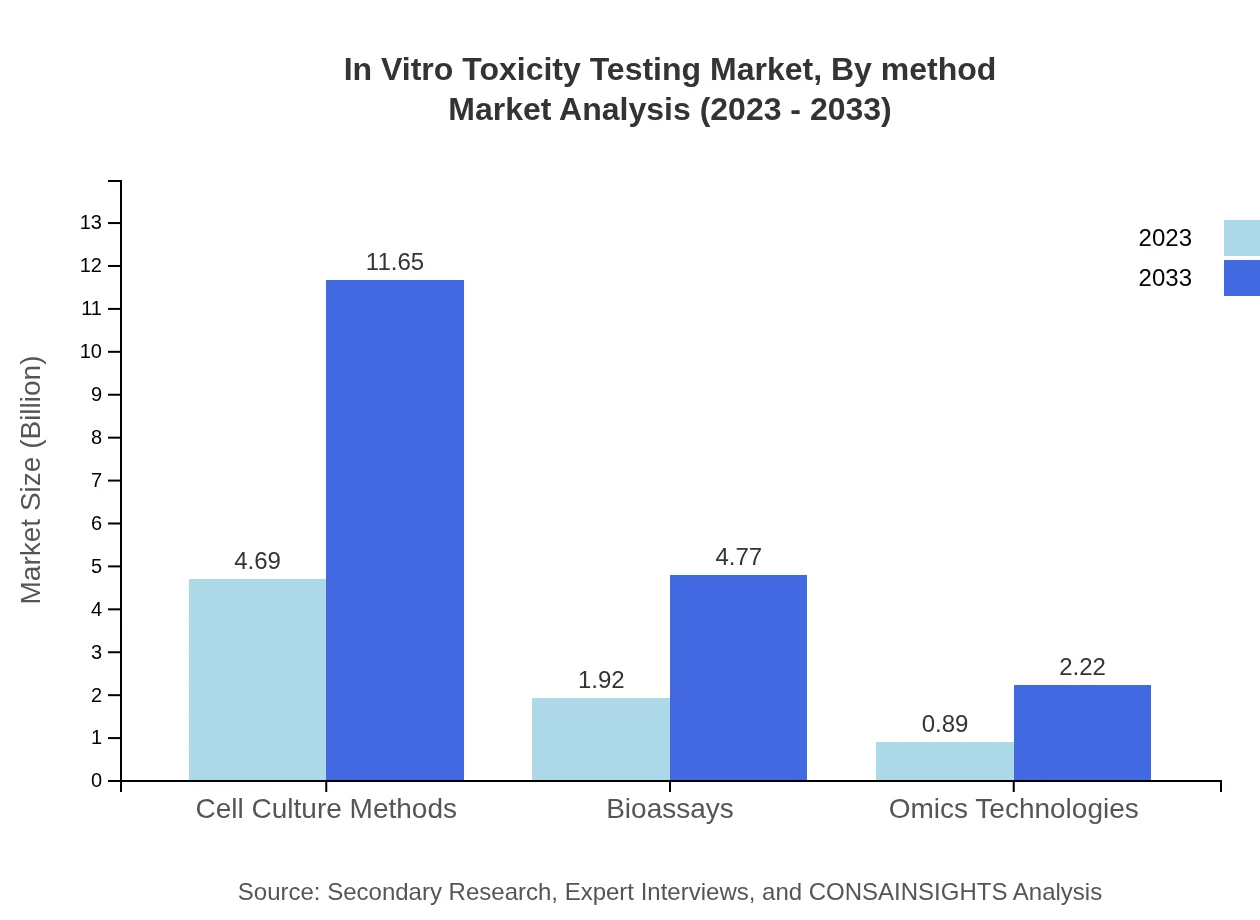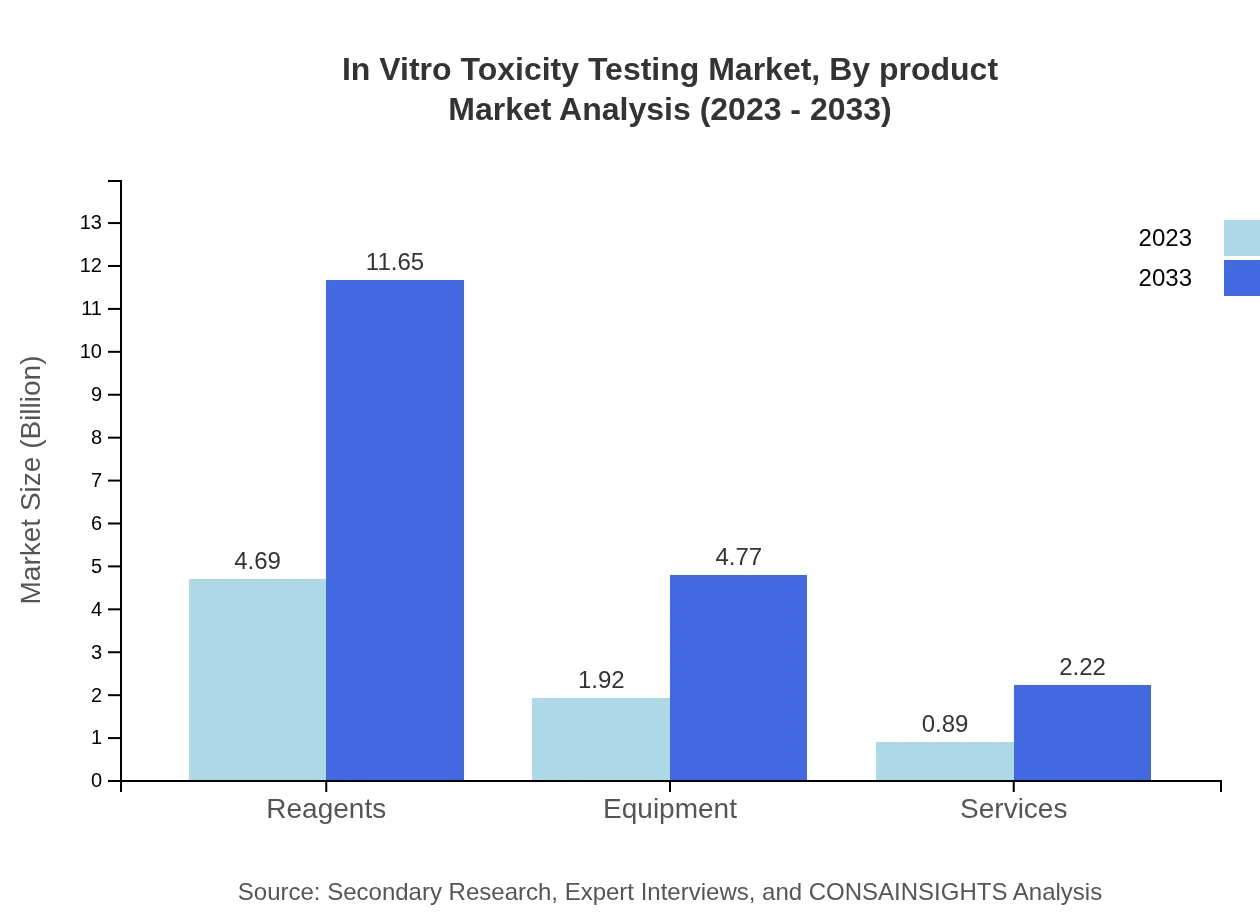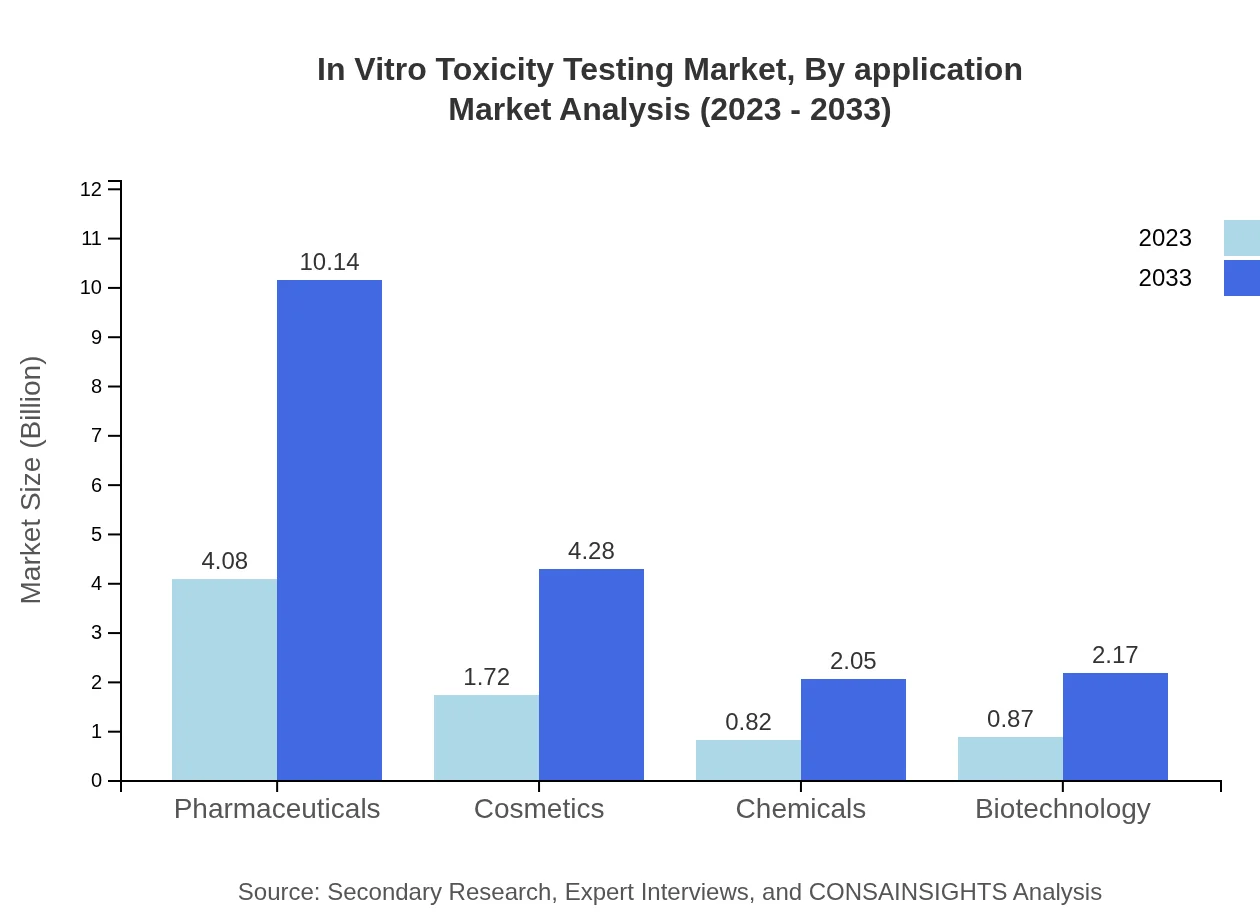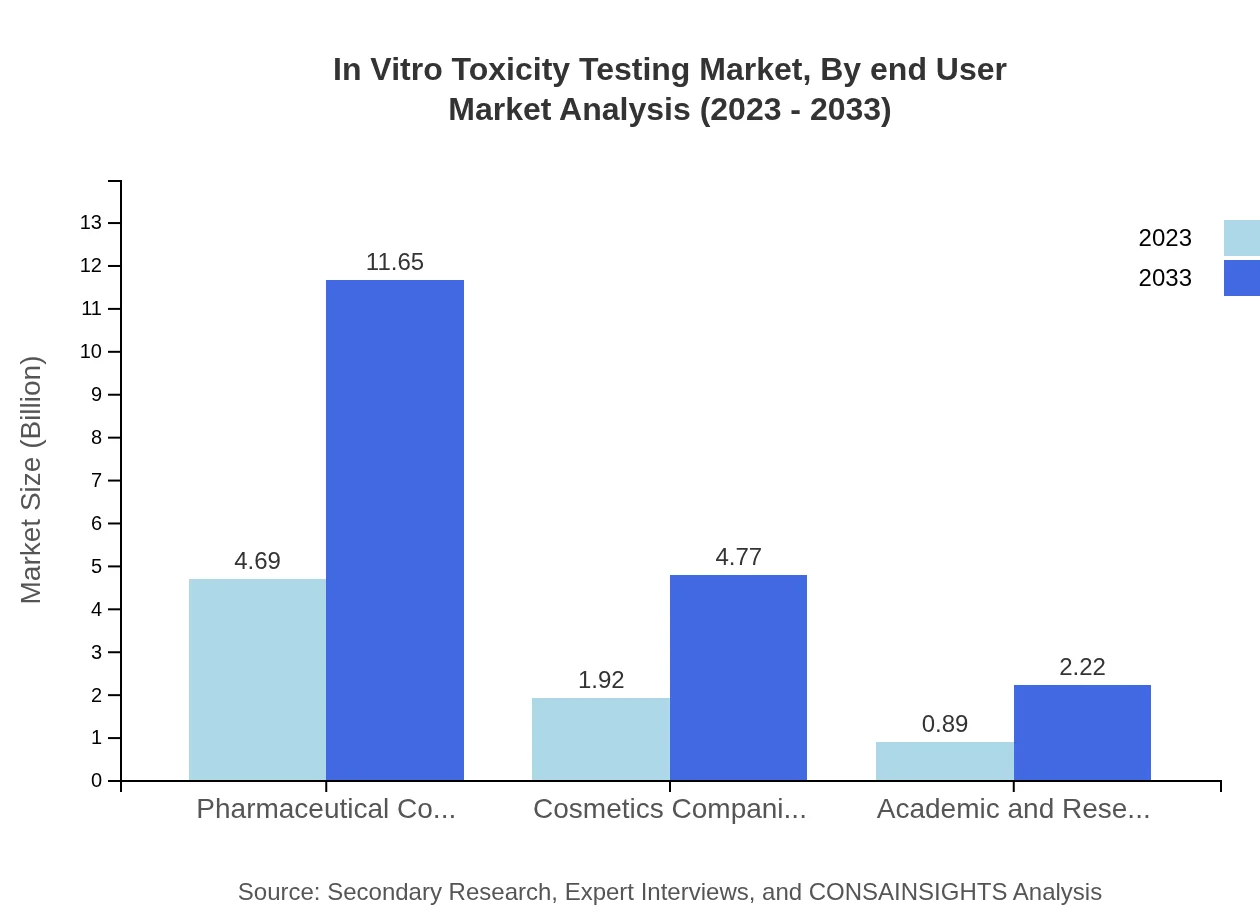In Vitro Toxicity Testing Market Report
Published Date: 31 January 2026 | Report Code: in-vitro-toxicity-testing
In Vitro Toxicity Testing Market Size, Share, Industry Trends and Forecast to 2033
This report provides a comprehensive analysis of the In Vitro Toxicity Testing market, offering insights into market trends, size, segmentation, and growth forecasts from 2023 to 2033.
| Metric | Value |
|---|---|
| Study Period | 2023 - 2033 |
| 2023 Market Size | $7.50 Billion |
| CAGR (2023-2033) | 9.2% |
| 2033 Market Size | $18.63 Billion |
| Top Companies | Invitro Technologies, Cellestia Biotech, MilliporeSigma, Thermo Fisher Scientific, Charles River Laboratories |
| Last Modified Date | 31 January 2026 |
In Vitro Toxicity Testing Market Overview
Customize In Vitro Toxicity Testing Market Report market research report
- ✔ Get in-depth analysis of In Vitro Toxicity Testing market size, growth, and forecasts.
- ✔ Understand In Vitro Toxicity Testing's regional dynamics and industry-specific trends.
- ✔ Identify potential applications, end-user demand, and growth segments in In Vitro Toxicity Testing
What is the Market Size & CAGR of In Vitro Toxicity Testing market in 2023?
In Vitro Toxicity Testing Industry Analysis
In Vitro Toxicity Testing Market Segmentation and Scope
Tell us your focus area and get a customized research report.
In Vitro Toxicity Testing Market Analysis Report by Region
Europe In Vitro Toxicity Testing Market Report:
Europe's in vitro toxicity testing market is valued at USD 2.36 billion in 2023, with projections to grow to USD 5.86 billion by 2033. Strict regulatory frameworks and ethical considerations surrounding animal testing are driving adoption of in vitro solutions within the cosmetic and pharmaceutical industries in countries like Germany, France, and the UK.Asia Pacific In Vitro Toxicity Testing Market Report:
In the Asia Pacific region, the In Vitro Toxicity Testing market is valued at USD 1.47 billion in 2023, anticipated to grow to USD 3.65 billion by 2033. The growth is propelled by increasing research and development activities, rising drug demand, and growing awareness of the significance of toxicity testing. Countries like China and India are emerging as key players due to their expanding pharmaceutical markets and investment in biotech research.North America In Vitro Toxicity Testing Market Report:
North America represents one of the largest markets, with a valuation of USD 2.51 billion in 2023 and forecasted to reach USD 6.24 billion by 2033. The region benefits from robust advancement in technology, high healthcare expenditure, and a significant number of R&D initiatives undertaken by pharmaceutical companies focusing on effective toxicity testing methods.South America In Vitro Toxicity Testing Market Report:
The South American market is relatively smaller, with a value of USD 0.30 billion in 2023, projected to grow to USD 0.75 billion by 2033. Factors aiding growth include the expansion of the biopharmaceutical industry and increased collaboration between local manufacturers and research organizations. Focus on regulatory compliance in product safety will also uplift the market dynamics.Middle East & Africa In Vitro Toxicity Testing Market Report:
Currently, the Middle East and Africa market reflects a value of USD 0.86 billion in 2023, expected to reach USD 2.13 billion by 2033, due to rising investments in healthcare infrastructure and biopharmaceuticals. Growing awareness regarding toxicology testing and product safety regulations will further stimulate market growth in this region.Tell us your focus area and get a customized research report.
In Vitro Toxicity Testing Market Analysis By Method
The In Vitro Toxicity Testing market by method features several critical approaches: Cell Culture Methods dominate with a market size of USD 4.69 billion in 2023, expected to rise to USD 11.65 billion by 2033, representing a share of 62.51%. Bioassays follow with a market size of USD 1.92 billion in 2023 and projected growth to USD 4.77 billion by 2033 (25.58% share). Omics Technologies represent a smaller segment with USD 0.89 billion, growing to USD 2.22 billion (11.91% share) over the forecast period.
In Vitro Toxicity Testing Market Analysis By Product
By product, the market is segmented into reagents, equipment, and services. Reagents hold the largest market share at USD 4.69 billion in 2023, anticipated to grow to USD 11.65 billion by 2033 (62.51% share). Equipment is positioned next, with an expected growth from USD 1.92 billion to USD 4.77 billion (25.58% share). Services, while smaller, are also essential, representing USD 0.89 billion in 2023 and projected growth to USD 2.22 billion (11.91% share).
In Vitro Toxicity Testing Market Analysis By Application
When analyzing by application, the Pharmaceuticals sector leads the market significantly, reflecting a size of USD 4.08 billion in 2023 and expected growth to USD 10.14 billion by 2033 (54.44% share), driven by rigorous drug safety evaluations. The Cosmetics sector holds USD 1.72 billion in 2023, projected to grow to USD 4.28 billion (22.95% share). The Chemicals and Biotechnology sectors with 10.99% and 11.62% shares, respectively, show growth potential as regulatory scrutiny increases on chemical safety.
In Vitro Toxicity Testing Market Analysis By End User
The major end-users in the In Vitro Toxicity Testing market include pharmaceutical companies, cosmetics companies, and academic institutions. Pharmaceutical companies dominate the market with a size of USD 4.69 billion in 2023, anticipated to increase to USD 11.65 billion by 2033 (62.51% share). Cosmetics companies, while smaller, show significant growth potential, projected to realize revenue growth from USD 1.92 billion to USD 4.77 billion (25.58% share). Academic and Research Institutions also contribute to the market, increasing their share from USD 0.89 billion to USD 2.22 billion (11.91% share).
In Vitro Toxicity Testing Market Trends and Future Forecast
Tell us your focus area and get a customized research report.
Global Market Leaders and Top Companies in In Vitro Toxicity Testing Industry
Invitro Technologies:
A leader in in vitro testing solutions, Invitro Technologies provides innovative approaches to assess toxicity through advanced cell culture techniques, significantly supporting drug development processes.Cellestia Biotech:
Cellestia Biotech specializes in the development of in vitro testing kits and services that accelerate the drug discovery process, focusing on safe chemical development and providing critical data for various stakeholders.MilliporeSigma:
MilliporeSigma offers a wide range of products and services for in vitro research, including reagents and assay solutions critical for toxicity testing across multiple industries.Thermo Fisher Scientific:
Known for their extensive product portfolio, Thermo Fisher Scientific provides essential tools and technologies for toxicity testing, facilitating high-quality research and compliance in product assessment.Charles River Laboratories:
Charles River Laboratories delivers comprehensive in vitro testing services, utilizing their expertise in drug development and regulatory compliance to enhance the safety of products across the healthcare spectrum.We're grateful to work with incredible clients.









FAQs
What is the market size of in Vitro Toxicity Testing?
The global in-vitro toxicity testing market is valued at approximately $7.5 billion in 2023 and is anticipated to grow at a CAGR of 9.2% through 2033.
What are the key market players or companies in the in Vitro Toxicity Testing industry?
Key players in the in-vitro toxicity testing industry include major pharmaceuticals, cosmetics companies, and specialized biotechnology firms. These organizations lead innovation through advanced technologies and methodologies in toxicity evaluations.
What are the primary factors driving the growth in the in Vitro Toxicity Testing industry?
Market growth is driven by increasing regulatory demands for safety assessments, the rising adoption of alternative testing methods over animal testing, and advancements in research technologies that enhance the accuracy of toxicity predictions.
Which region is the fastest Growing in the in Vitro Toxicity Testing?
The North America region is the fastest-growing market, projected to grow from $2.51 billion in 2023 to $6.24 billion by 2033. Europe and Asia Pacific also exhibit significant expansion, reflecting strong demand for toxicity testing.
Does ConsaInsights provide customized market report data for the in Vitro Toxicity Testing industry?
Yes, ConsaInsights offers customized market report data tailored to specific needs within the in-vitro toxicity testing industry, ensuring relevant insights and analytics align with client requirements.
What deliverables can I expect from this in Vitro Toxicity Testing market research project?
Expect comprehensive deliverables including detailed market analysis reports, growth projections by regions and segments, competitor landscape studies, and insights into market trends that guide strategic decision-making.
What are the market trends of in Vitro Toxicity Testing?
Current trends include a shift towards automation and high-throughput screening in toxicity testing, increased integration of omics technologies, and a growing focus on personalized medicine approaches in pharmaceutical evaluations.

